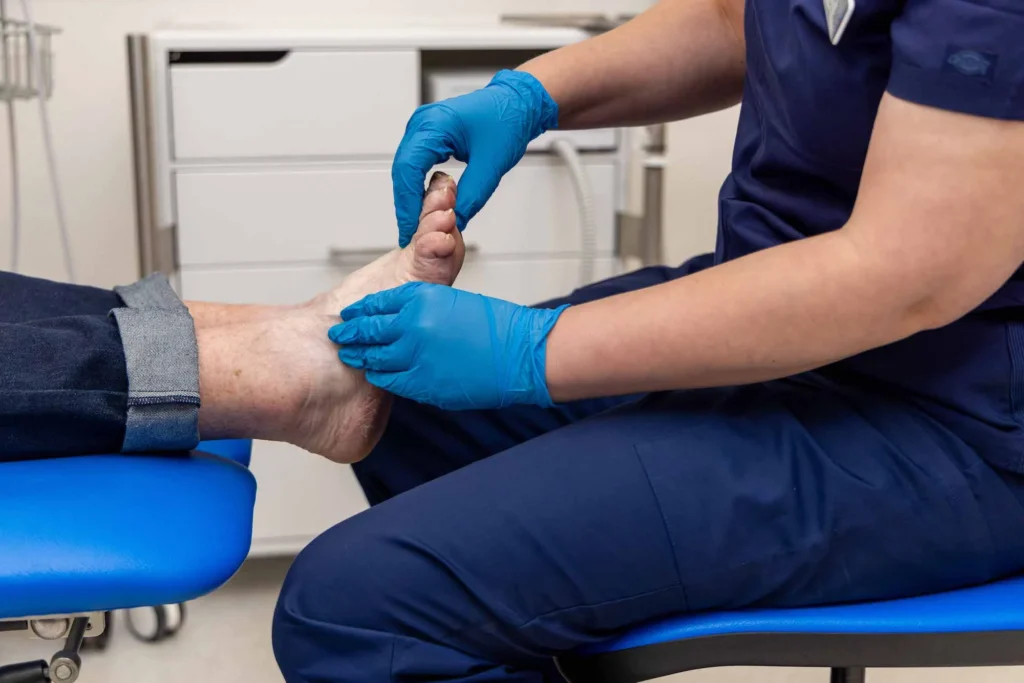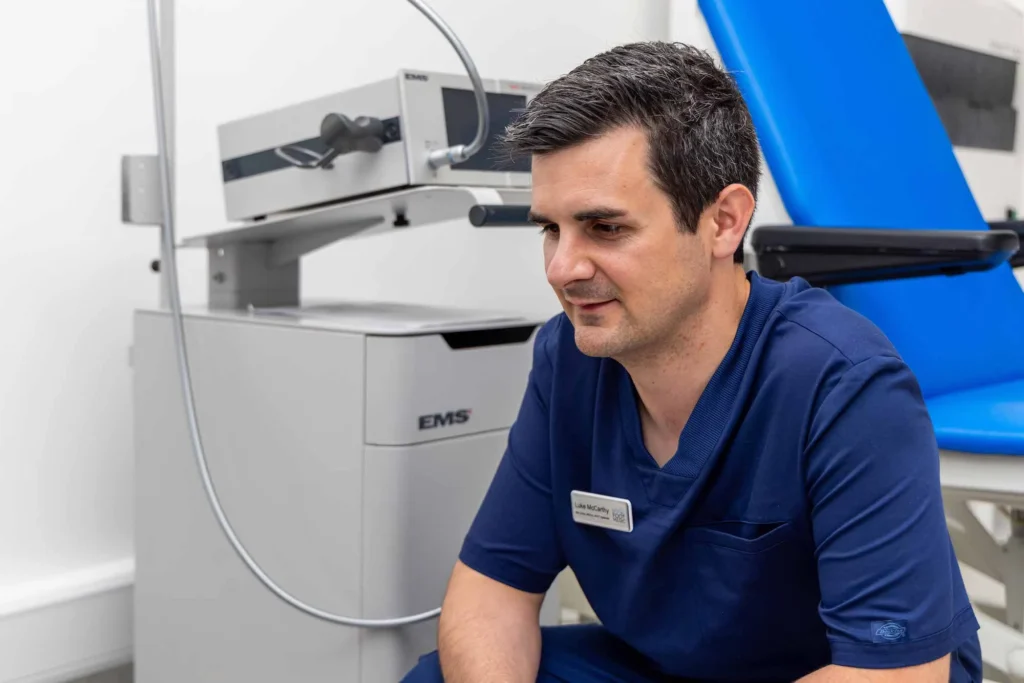SKIN SURGERY
Do you suffer from a painful or irritating skin lesion on your foot? If so, skin surgery might hold the solution you’ve been looking for!

Services
WHAT IS SKIN SURGERY?
Skin surgery is the removal of a skin lesion or a part of a skin lesion, the wound may then be closed via stitches or left to naturally heal if the area is small. Podiatrists may recommend skin surgery for two primary reasons.
Firstly, it serves as an effective diagnostic tool for identifying the skin lesion. If you have concerns about a changing mole or any abnormal skin growth, a biopsy can provide crucial insights. Subsequent laboratory analysis can help detect serious conditions such as skin cancer or identify any present infections.
Secondly, skin surgery can offer the best treatment for sources of pain or discomfort. It is instrumental in resolving persistent verrucae, intractable plantar keratosis, hypergranulation tissue from wounds, cutaneous horns, pyogenic granuloma, painful corns, and scar tissue. This targeted approach aims to alleviate discomfort and address specific skin-related issues effectively.
Trust our skilled podiatrists to perform skin surgery with precision, tailored to address your unique concerns and provide lasting relief.
WHAT DOES SKIN SURGERY TREAT?
Skin surgery is a versatile solution that effectively addresses various conditions, including:
• Abnormal skin growths or changing moles
• Persistent verrucae
• Intractable plantar keratosis (a painful callus)
• Hypergranulation tissue from a wound
• Cutaneous horns (conical protrusions of keratin)
• Pyogenic granuloma (benign swellings)
• Painful corns
• Scar tissue
Our skilled professionals specialise in providing targeted and effective skin surgery treatments, tailored to alleviate discomfort and address specific skin-related concerns.
HOW CAN SKIN SURGERY HELP ME?
Skin surgery offers tailored solutions to address a range of concerns, providing the following benefits:
Resolution of Discomfort: Whether you are experiencing persistent verrucae, painful calluses, or other sources of discomfort, skin surgery aims to alleviate these issues, allowing you to regain comfort and mobility.
Treatment of Abnormal Skin Growth: Skin surgery can effectively address abnormal skin growths, changing moles, and other concerning conditions, providing peace of mind and potential early intervention for serious issues such as skin cancer.
Experience the relief and confidence that comes with targeted skin surgery solutions, designed to address your individual concerns effectively.

HOW DOES SKIN SURGERY WORK?
Skin surgery involves a meticulous and targeted approach to addressing various skin conditions. The process typically includes the following key steps:
1
Assessment and Diagnosis:
2
Tailored Treatment Plan:
3
Precision Procedures:
4
Recovery and Follow-Up:
LET'S ANSWER YOUR SKIN SURGERY QUESTIONS!
No, whilst many treatments can be performed during your initial appointment, this procedure requires a pre-assessment to determine that it is safe and appropriate to proceed with. The pre-assessment forms a part of your initial appointment. During your first visit, our experienced podiatrist will conduct a comprehensive assessment of your condition. This evaluation allows us to understand your individual needs, make a diagnosis, understand any causative factors to reduce the risk of future recurrence, explain all available treatment options available, and develop a personalised care plan tailored to your specific issue and needs. After the initial appointment, we can then schedule this procedure if appropriate.
Skin surgery is typically performed under local anaesthesia, which numbs the specific area being treated. This helps minimise discomfort during the procedure. While some mild discomfort or pressure may be felt, it is generally well-tolerated by patients. Additionally, post-operative pain is usually minimal and can be managed with over-the-counter pain medication as recommended by your podiatrist.
Skin surgery may result in some degree of scarring, as with any surgical procedure. However, the extent of scarring can vary depending on the type of surgery and individual skin characteristics.
Efforts are usually made to minimise scarring, and your podiatrist can discuss techniques to promote optimal healing and reduce the visibility of scars. These may include proper wound care, scar management treatments, and other strategies tailored to your specific needs.
It’s important to have a thorough discussion with your podiatrist about scarring concerns before undergoing skin surgery.
They can provide personalised information and address any specific questions or worries you may have about scarring.
The recovery time after skin surgery can vary based on the type and extent of the procedure, as well as
individual healing capabilities. In general, most patients can expect a relatively short recovery period.
For minor skin surgeries, such as the removal of small lesions, recovery may involve minimal downtime.
More extensive procedures may require a longer recovery period, during which patients may need to take time off work and avoid strenuous activities.
Your podiatrist will provide specific post-operative instructions tailored to your procedure and individual needs. They will outline details regarding wound care, activity restrictions, and any necessary follow-up
appointments to monitor your recovery progress.
It’s important to follow your podiatrist’s guidance closely to support the healing process and achieve the best possible outcome.
It’s important to have a detailed discussion with your podiatrist about these potential risks before
proceeding with skin surgery. They can provide personalised information and address any concerns you may have about the procedure.
The timeline for returning to normal activities after skin surgery can vary depending on the specific procedure and individual healing progress.
Generally, for minor skin surgeries, such as the removal of small lesions, patients may be able to resume normal activities within two to four weeks. However, more extensive procedures may require a longer recovery period.
Your podiatrist will provide specific post-operative instructions tailored to your procedure and your individual needs. These instructions will include guidance on wound care, activity restrictions, and any necessary follow-up appointments to monitor your recovery progress.
It’s essential to follow your podiatrist’s recommendations closely to support the healing process and ensure the best possible outcome. If you have any concerns or questions about returning to normal activities after skin surgery, do not hesitate to discuss them with your podiatrist.
No, a podiatrist specialises in the diagnosis and treatment of conditions related to the foot and ankle. While they are skilled in performing skin surgery on the foot and up to the level of the ankles, their expertise and scope of practice are primarily focused on lower extremity care. For skin surgeries or conditions beyond this area, it is advisable to consult with a dermatologist or a healthcare professional specialising in the specific area of concern.
SKIN SURGERY AND TREATMENT FROM MYFOOTMEDIC
Whether you’re undergoing skin lesion excision to alleviate pain and reduce symptoms or to investigate an underlying cause, the MyFootMedic team will ensure you get the best treatment possible.
Before your surgery, we’ll make sure you understand the full procedure and are comfortable. Our knowledgable team has years of experience in foot surgery, and our clinic in Bedford is fully equipped with state-of-the-art equipment to ensure the highest levels of care and hygiene. If you’re concerned about a mole, growth or another skin complaint, please don’t hesitate to get in touch to discuss the issue. Alternatively, use our online booking system to arrange an appointment.




